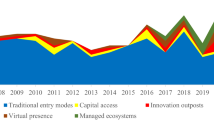Abstract
The nature and source of entrepreneurial opportunity are important issues for understanding how markets function and come into being. In addition to describing the forum held on the topic and summarizing the contributions of the articles that appear in the special issue, this article shares a number of lessons learned during the workshop and the editorial process. We explore three of the most important reasons for confusion about the opportunity construct: (1) the “objectivity” of opportunity, (2) the perceived importance of one particular individual in determining the direction of the social world and (3) what distinguishes the sub-class of “entrepreneurial” opportunity from the broader category of opportunity in general. Finally, we offer some directions for future research by illuminating important issues that emerged from the workshop but that remain largely unanswered by the papers of this special issue.
Similar content being viewed by others
References
Acs Z. J., Audretsch D. B. (2003) Editor’s Introduction. Handbook of Entrepreneurship Research. Boston: Kluwer Academic Publishers, pp.23–20.
Alvarez S., Barney J. B. (2005) How do Entrepreneurs Organize Under Conditions of Uncertainty? Journal of Management 31(5):776–793.
Amabile T. M. (1996) Creativity in Context (Update to The Social Psychology of Creativity). Boulder: Westview Press.
Buchanan J. M. (1999) Cost and Choice: An Iquiry in Economic Theory. Indianapolis: Liberty Fund.
Casson M. (1982) The Entrepreneur. Totowa, NJ: Barnes & Noble Books.
Ebeling R. M. (1986) Towards a Hermeneutical Economics: Expectations, Prices and the Role of Interpretation in a Theory of the Market Process. In: I. M. Kirzner (ed.), Subjectivism, Intelligibiity and Economic Understanding: Essays in Honor of Ludwig Lachmann on his Eightieth Birthday. New York: New York University Press, pp 39–55.
Hebert R. F., Link A. N. (2007) Historical Perspectives on the Entrepreneur, Foundations and Trends in Entrepreneurship. Boston: NOW Publishing.
Holcombe R. (2003) The Origins Of Entrepreneurial Opportunities. Review of Austrian Economics 16: 25–43.
Homans G. C. (1974) Social Behavior: Its Elementary Forms. New York: Harcourt Brace Jovanovich, Inc.
Kirzner I. (1973) Competition and Entrepreneurship. Chicago and London: University of Chicago Press.
Kirzner I. (1997) Entrepreneurial Discovery and the Competitive Market Process: An Austrian Approach. The Journal of Economic Literature 35: 60–85.
Lepak D. P., K. G. Smith and M. S. Taylor, 2007, ‚Value Creation and Value Capture: A Multi-level Perspective’, Academy of Management Review, 32(1), 180–194.
McMullen J. S. and D. A. Shepherd, 2006, ‚Encouraging Consensus Challenging Research in Universities’, Journal of Management Studies, 43(8), 1643–1669.
Mises L. V. (1949) Human Action. New Haven: Yale University Press.
North D. C. (1990). Institutions, Institutional Change and Economic Performance. Cambridge, UK: Cambridge University Press.
Ray M. (2004). The Highest Goal. San Francisco: Berrett-Koehler Publishers, Inc.
Schumpeter J. (1934) The Theory Of Economic Development. Cambridge: Harvard University Press.
Shackle G. L. S. (1979) Imagination and the Nature of Choice. Edinburgh: Edinburgh University Press.
Shane S., Venkataraman S. (2000) The Promise of Entrepreneurship as a Field of Research. Academy of Management Review 25(1): 217–226.
Shane S. 2003. A General Theory of Entrepreneurship: The Individual-Opportunity Nexus. Northampton, MA: Edward Elgar Publishing, Inc.
Simon, H., 1986. ‚Rationality in Psychology and Economics’, in Robin M. Hogarth and Melvin W. Reder (eds.), The Behavioral Foundations of Economic Theory. Journal of Business, 59(supplement), S209–S24.
Weick, K. E., 1979. The Social Psychology of Organizing, 2nd Edition. New York: McGraw-Hill.
Author information
Authors and Affiliations
Corresponding author
Rights and permissions
About this article
Cite this article
McMullen, J.S., Plummer, L.A. & Acs, Z.J. What is an Entrepreneurial Opportunity?. Small Bus Econ 28, 273–283 (2007). https://doi.org/10.1007/s11187-006-9040-z
Accepted:
Published:
Issue Date:
DOI: https://doi.org/10.1007/s11187-006-9040-z




